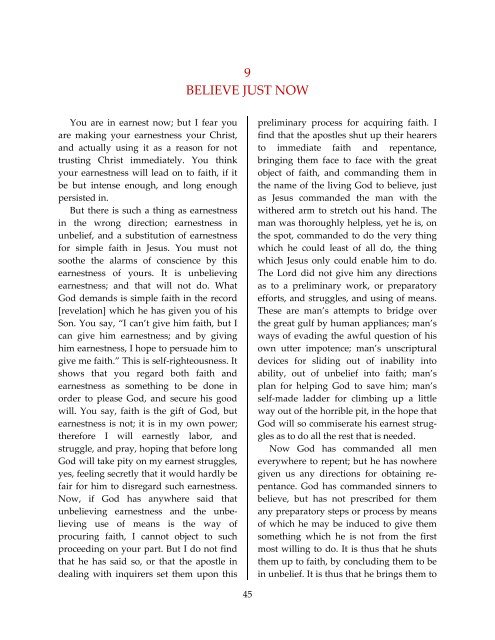God's Way of Peace by Horatius Bonar, D.D.
The seasoned Scottish pastor wrote this short devotional for those suffering from guilt, anxiety, or the consequences of sin. He writes with neither chastisement nor condemnation, but rather immediately directs his readers to Christ’s gift of salvation through his death and resurrection. Bonar reminds all that the Gospel offers hope for the sinner and comfort for the troubled, for God’s perfect, constant grace never fails those who accept it. From Bonar’s time to the present, people have found peace with God afresh through this book. Many people report having read it several times, and turning to it again and again when troubles arise. Kathleen O’Bannon CCEL Staff
The seasoned Scottish pastor wrote this short devotional for those suffering from guilt, anxiety, or the consequences of sin. He writes with neither chastisement nor condemnation, but rather immediately directs his readers to Christ’s gift of salvation through his death and resurrection. Bonar reminds all that the Gospel offers hope for the sinner and comfort for the troubled, for God’s perfect, constant grace never fails those who accept it. From Bonar’s time to the present, people have found peace with God afresh through this book. Many people report having read it several times, and turning to it again and again when troubles arise.
Kathleen O’Bannon
CCEL Staff
You also want an ePaper? Increase the reach of your titles
YUMPU automatically turns print PDFs into web optimized ePapers that Google loves.
GOD’S WAY OF PEACE<br />
9<br />
BELIEVE JUST NOW<br />
You are in earnest now; but I fear you<br />
are making your earnestness your Christ,<br />
and actually using it as a reason for not<br />
trusting Christ immediately. You think<br />
your earnestness will lead on to faith, if it<br />
be but intense enough, and long enough<br />
persisted in.<br />
But there is such a thing as earnestness<br />
in the wrong direction; earnestness in<br />
unbelief, and a substitution <strong>of</strong> earnestness<br />
for simple faith in Jesus. You must not<br />
soothe the alarms <strong>of</strong> conscience <strong>by</strong> this<br />
earnestness <strong>of</strong> yours. It is unbelieving<br />
earnestness; and that will not do. What<br />
God demands is simple faith in the record<br />
[revelation] which he has given you <strong>of</strong> his<br />
Son. You say, “I can’t give him faith, but I<br />
can give him earnestness; and <strong>by</strong> giving<br />
him earnestness, I hope to persuade him to<br />
give me faith.” This is self‐righteousness. It<br />
shows that you regard both faith and<br />
earnestness as something to be done in<br />
order to please God, and secure his good<br />
will. You say, faith is the gift <strong>of</strong> God, but<br />
earnestness is not; it is in my own power;<br />
therefore I will earnestly labor, and<br />
struggle, and pray, hoping that before long<br />
God will take pity on my earnest struggles,<br />
yes, feeling secretly that it would hardly be<br />
fair for him to disregard such earnestness.<br />
Now, if God has anywhere said that<br />
unbelieving earnestness and the unbelieving<br />
use <strong>of</strong> means is the way <strong>of</strong><br />
procuring faith, I cannot object to such<br />
proceeding on your part. But I do not find<br />
that he has said so, or that the apostle in<br />
dealing with inquirers set them upon this<br />
preliminary process for acquiring faith. I<br />
find that the apostles shut up their hearers<br />
to immediate faith and repentance,<br />
bringing them face to face with the great<br />
object <strong>of</strong> faith, and commanding them in<br />
the name <strong>of</strong> the living God to believe, just<br />
as Jesus commanded the man with the<br />
withered arm to stretch out his hand. The<br />
man was thoroughly helpless, yet he is, on<br />
the spot, commanded to do the very thing<br />
which he could least <strong>of</strong> all do, the thing<br />
which Jesus only could enable him to do.<br />
The Lord did not give him any directions<br />
as to a preliminary work, or preparatory<br />
efforts, and struggles, and using <strong>of</strong> means.<br />
These are man’s attempts to bridge over<br />
the great gulf <strong>by</strong> human appliances; man’s<br />
ways <strong>of</strong> evading the awful question <strong>of</strong> his<br />
own utter impotence; man’s unscriptural<br />
devices for sliding out <strong>of</strong> inability into<br />
ability, out <strong>of</strong> unbelief into faith; man’s<br />
plan for helping God to save him; man’s<br />
self‐made ladder for climbing up a little<br />
way out <strong>of</strong> the horrible pit, in the hope that<br />
God will so commiserate his earnest struggles<br />
as to do all the rest that is needed.<br />
Now God has commanded all men<br />
everywhere to repent; but he has nowhere<br />
given us any directions for obtaining repentance.<br />
God has commanded sinners to<br />
believe, but has not prescribed for them<br />
any preparatory steps or process <strong>by</strong> means<br />
<strong>of</strong> which he may be induced to give them<br />
something which he is not from the first<br />
most willing to do. It is thus that he shuts<br />
them up to faith, <strong>by</strong> concluding them to be<br />
in unbelief. It is thus that he brings them to<br />
45

















